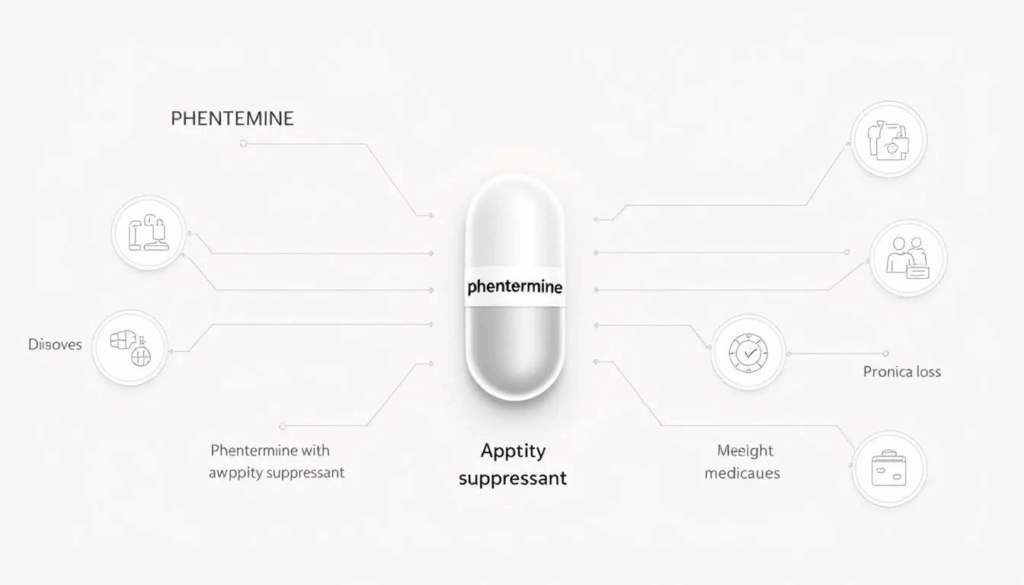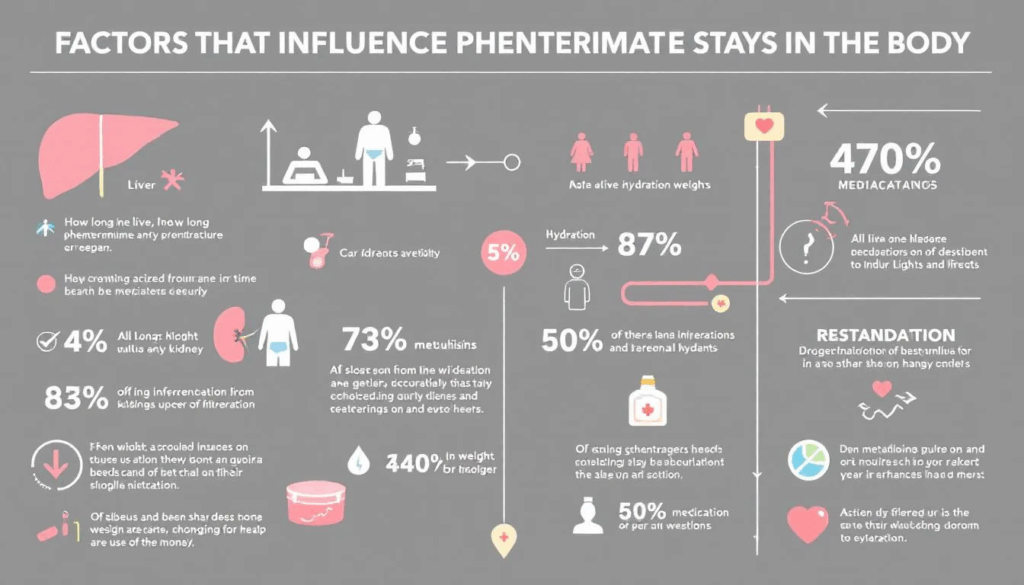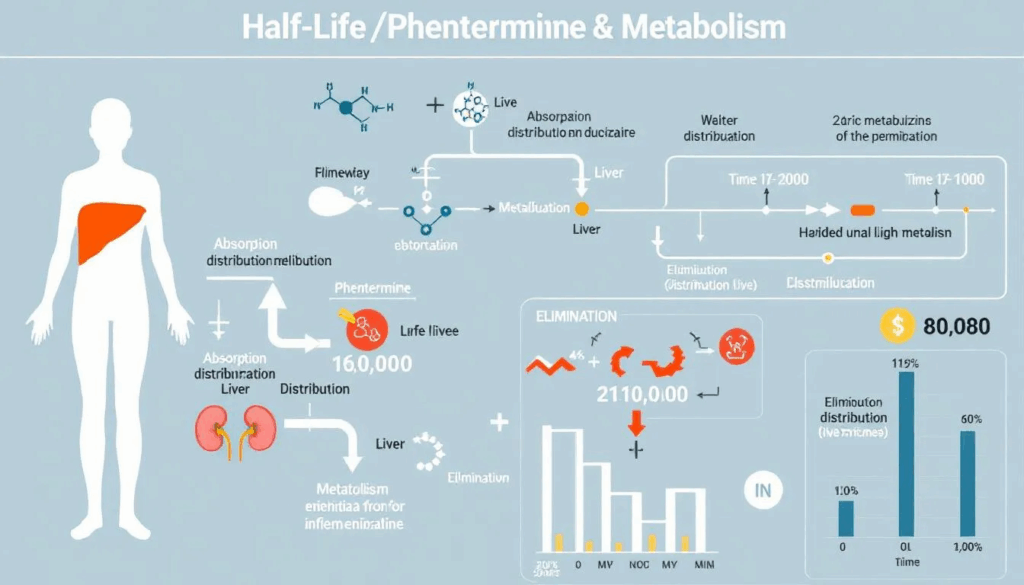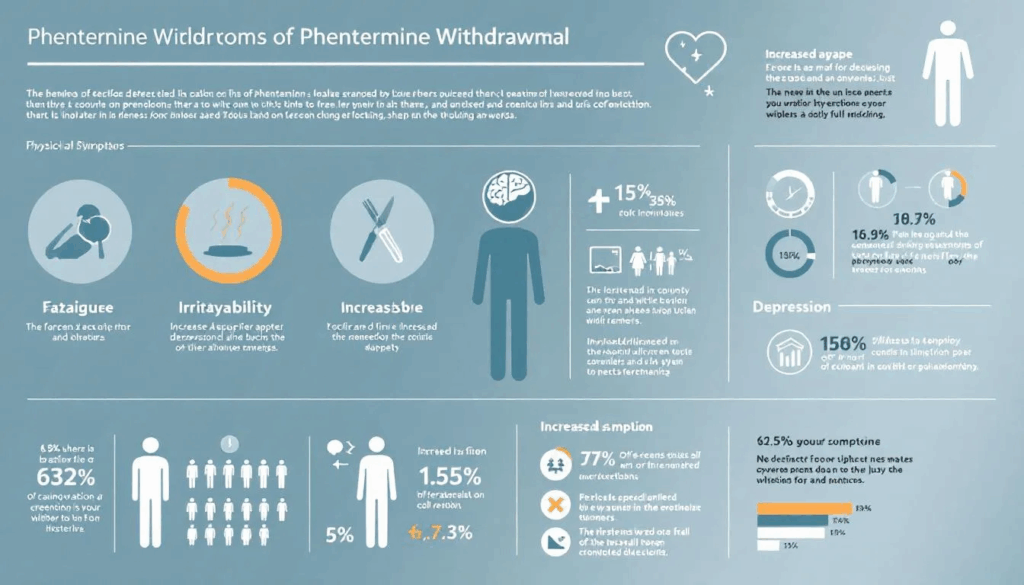Phentermine typically stays in your system for up to three days, though it can vary based on individual factors. The drug’s half-life is between 19 to 24 hours, but how long does phentermine stay in your system depends on aspects like metabolism, age, dosage, and the type of drug test.
Phentermine’s chemical structure is similar to other stimulants, which affects how it is metabolized in the body and how it is detected in drug tests.
This article will cover these factors and explain the detection times for urine, blood, saliva, and hair tests.
Key Takeaways
- Phentermine is a prescription stimulant used as an appetite suppressant, primarily for weight loss in individuals with obesity and related health complications.
- Phentermine should only be used under a doctor’s prescription to ensure safety and effectiveness.
- Phentermine is prescribed to treat obesity as part of a comprehensive weight management plan.
- The duration Phentermine remains in the system is influenced by factors such as dosage, age, metabolic rate, and liver/kidney health, with its average half-life ranging from 19 to 24 hours.
- Withdrawal from Phentermine may lead to symptoms like fatigue, weight gain, and mood changes, emphasizing the importance of a medically supervised discontinuation plan.
Understanding Phentermine and Its Uses

Phentermine is a water-soluble medication classified as a prescription stimulant drug, and is often grouped with other diet pills prescribed for weight loss. Known for its role as an appetite suppressant, Phentermine works by stimulating the central nervous system, which helps to decrease appetite suppression and, ultimately, assist in weight loss. Typically prescribed for individuals struggling with obesity, phentermine is generally given to patients with a body mass index (BMI) of 30 or higher, or those with a BMI of 27 and related health conditions such as diabetes, high cholesterol, or high blood pressure. Individuals may take phentermine in these cases, and prescribed phentermine is often recommended.
The way Phentermine works is quite fascinating. Phentermine has a similar chemical structure to other stimulant drugs, which contributes to its effects and potential for misuse. It affects neurotransmitters in the brain, reducing hunger sensations and making it easier to follow a calorie-restricted diet. Sometimes, phentermine is prescribed when other drugs for weight loss are not effective. The effects of Phentermine can be felt within a few hours to one or two days after taking it, which allows users to experience immediate support in their weight loss efforts. If you’re wondering how does phentermine work, it primarily helps by curbing appetite. Additionally, understanding how phentermine work can enhance your approach to weight loss.
However, like all medications, Phentermine comes with potential side effects. Users might experience:
- Increased heart rate
- Elevated blood pressure
- Dry mouth
- Anxiety
- Headaches
- Constipation
- Difficulty sleeping
- Trouble sleeping
These side effects highlight the importance of medical supervision when using Phentermine to ensure that benefits outweigh the risks. Misuse of phentermine or other stimulant drugs can lead to substance abuse, and it is important to distinguish prescription use from the use of illicit drugs.
Factors Influencing Phentermine Retention in Your System

Several factors can influence how long Phentermine stays in your system, affecting its distribution, metabolism, and excretion. Higher levels of body fat can influence how phentermine is distributed and metabolized, potentially prolonging its presence in the body. Age, health conditions, and concurrent medication use all play significant roles in this process.
Understanding these factors can help you better manage your Phentermine intake and anticipate any potential side effects or complications.
Dosage and Frequency of Intake
The dosage and frequency of Phentermine intake are crucial determinants of how long the drug stays in your system. Higher dosages can prolong the presence of Phentermine in the body, as the system takes longer to eliminate larger amounts of the drug. Similarly, frequent intake can extend the duration Phentermine remains active in your system.
Managing dosage and frequency is vital for achieving optimal weight loss results while minimizing health risks. Following the prescribed dosage and maintaining a consistent intake schedule, along with a balanced diet and exercise plan, ensures the best outcomes.
Impact of Age and Metabolic Rate
Age and metabolic rate significantly influence how quickly Phentermine is processed and eliminated from the body. Generally, younger individuals with healthy organ function can metabolize Phentermine more rapidly compared to older adults. Additionally, maintaining proper hydration can aid in the quicker elimination of the drug, while a slower metabolic rate can prolong its presence in your system.
Role of Liver and Kidney Health
The health of your liver and kidneys plays a crucial role in the metabolism and excretion of Phentermine. Impaired liver or kidney function can lead to higher concentrations of Phentermine in the body due to reduced elimination capacity. Conditions such as advanced heart disease, kidney disease, and chronic liver disorders can negatively impact the drug’s metabolism, necessitating careful monitoring and possible dosage adjustments.
The Impact of Your Last Dose on Phentermine Retention
The timing and amount of your last dose of phentermine play a significant role in how long the drug stays in your system. After you take your final dose, your body immediately begins the process of eliminating phentermine, but this process is influenced by several factors. Phentermine’s half-life—typically between 19 and 24 hours—means that it takes about a day for your body to reduce the drug’s concentration by half. However, the actual duration phentermine stays in your system can vary based on your metabolic rate, kidney function, and overall health.
Because phentermine works by stimulating the central nervous system to suppress appetite, its effects can linger even as the drug is being cleared from your body. Individuals with a faster metabolic rate or healthy kidney function may eliminate phentermine more quickly, while those with slower metabolism or impaired kidneys may find that phentermine stays in their system longer. Understanding how phentermine works and how your body processes the last dose can help you better manage your weight loss plan and minimize potential side effects as you transition off the medication.
Phentermine's Half-Life and Metabolism

Understanding Phentermine’s half life and metabolism is key to grasping how long it stays in your system. The phentermine half life of a drug is the time it takes for its concentration in the blood to reduce by half. For Phentermine, the average half-life ranges between 19 to 24 hours, meaning that it takes about one to two days for its levels to decrease significantly. This variability can depend on individual metabolic rates and overall health.
Phentermine is primarily metabolized by the liver’s enzymes, which break down the drug to facilitate its excretion. The liver’s efficiency in processing Phentermine can be influenced by factors such as age, genetic makeup, and the presence of other medications or substances.
These factors collectively determine how long Phentermine remains active in the body and how quickly it is eliminated.
Detection Times for Phentermine in Drug Tests

Detecting Phentermine in the body can be achieved through various drug tests, each with different detection windows. Drug screens are commonly used to detect phentermine in the body. These tests are the most common testing method for monitoring compliance in clinical settings and for ensuring safe usage.
The detection window of Phentermine varies based on the testing method and individual factors, ranging from a few days to several months. Individuals may test positive for amphetamines on certain drug screens due to phentermine’s chemical similarity. Blood, urine, and hair tests can also be utilized for similar purposes. A hair follicle test is considered highly reliable for detecting phentermine use over a 90-day period.
Urine Tests
Urine tests are one of the most common methods for detecting Phentermine. Typically, Phentermine can be detected in urine for 48 to 72 hours after the last dose. This urine test method is widely used due to its non-invasive nature and reliability in identifying recent urine drug tests.
Blood Tests
Blood tests can detect Phentermine for a shorter duration, usually up to 24 hours after the last dose. While a blood test is less common for routine monitoring, it provides precise information about the current levels of Phentermine in the bloodstream, which can be critical for medical assessments.
Saliva Tests
Saliva tests are another effective method for detecting Phentermine, with the following characteristics:
- Detection window of 24 to 48 hours after consumption
- Convenient and non-invasive
- Suitable for various settings, including workplace drug testing and clinical monitoring. A saliva test is also beneficial for its ease of use.
Hair Follicle Tests
Hair follicle tests provide the longest detection window for Phentermine, capable of identifying usage up to 90 days after the last intake. This method is commonly used to detect long-term drug use, as Phentermine remains embedded in the hair shafts. Hair tests can also be utilized for similar purposes.
Factors That May Prolong Phentermine Retention
Various factors can prolong the retention of Phentermine and stay in your system, affecting its excretion rate and overall duration. These include drug interactions, lifestyle choices, and underlying health conditions. Calorie restriction, as part of a medically supervised weight loss plan, can also influence how quickly phentermine is metabolized and eliminated.
Understanding these factors can help manage Phentermine use more effectively and minimize potential risks.
Drug Interactions
Phentermine can interact with other medications, which may significantly affect its retention and excretion. Drugs like antidepressants and insulin can alter how long Phentermine stays in your system, potentially increasing its side effects.
Informing your healthcare provider about all medications you are taking, including any prescription medication or controlled substance, helps avoid adverse interactions.
Lifestyle and Dietary Habits
Lifestyle choices play a significant role in how long Phentermine stays in your system, including:
- Diet: A balanced diet can enhance metabolism.
- Hydration: Proper hydration helps in eliminating the drug more efficiently.
- Physical activity: Contributes to overall metabolism and drug processing.
Regular physical activity can also boost metabolic rates, aiding in quicker drug elimination.
Underlying Health Conditions
Certain chronic health conditions can significantly impact how long Phentermine remains in your system. Diseases such as diabetes, kidney disease, and chronic liver disorders can hinder the drug’s metabolism and clearance, prolonging its retention.
Understanding these impacts is crucial for effective and safe use of Phentermine.
Weight Loss with Phentermine: What to Expect
When taking phentermine as part of a weight loss program, you can expect to see meaningful results, especially when you combine the medication with a reduced calorie diet and regular physical activity. As an appetite suppressant, phentermine helps you consume fewer calories by reducing hunger, making it easier to stick to your diet and lose weight. Most people are typically prescribed phentermine for short-term use—usually between 3 and 6 weeks—to jumpstart their weight loss journey.
While taking phentermine, weight loss tends to occur at a steady pace, but individual results can vary depending on factors like adherence to a reduced calorie diet, level of physical activity, and your body’s unique response to the medication. It’s important to remember that phentermine is not a long-term solution; after stopping the medication, maintaining healthy habits is crucial to prevent weight gain. Always follow your doctor’s prescription and guidance to minimize adverse effects and maximize the benefits of this prescription weight loss medication.
Withdrawal Symptoms and Side Effects After Stopping Phentermine

Discontinuing Phentermine can lead to a range of withdrawal symptoms, both physical and psychological. Similar withdrawal symptoms can also occur when stopping other stimulant drugs. These symptoms can vary in severity and duration, making it essential to understand what to expect when stopping Phentermine.
Fatigue and Cognitive Impairment
Common withdrawal symptoms include fatigue and cognitive impairment. Individuals who have been taking large doses of Phentermine for an extended period are more susceptible to these symptoms.
Fatigue and a decrease in mental sharpness can significantly impact daily life, highlighting the need for a gradual reduction in dosage under medical supervision.
Weight Gain
After stopping Phentermine, many individuals experience an increase in appetite, which can lead to weight gain. This surge in hunger often results in consuming more calories than before, potentially reversing the weight loss achieved during Phentermine use.
Maintaining a balanced diet and exercise plan can help mitigate this effect.
Mood Changes and Cravings
Withdrawal from Phentermine can also lead to mood changes and cravings. The psychological dependence on Phentermine can result in intense cravings and mood disturbances due to changes in neurotransmitter levels in the brain, potentially leading to phentermine addiction.
These symptoms underscore the importance of a structured and supported discontinuation plan.
How to Safely Discontinue Phentermine
Safely discontinuing Phentermine requires careful planning and medical supervision to avoid severe withdrawal symptoms. Consulting a healthcare provider is crucial before stopping Phentermine to ensure a gradual reduction in dosage. This approach helps minimize risks such as extreme tiredness, cognitive difficulties, and potential seizures.
Following a structured weight management program can support the transition after stopping Phentermine. This program should include a balanced diet, regular physical activity, and monitoring for any adverse effects. Gradual dosage reduction, rather than abrupt cessation, is recommended to ensure a smooth and safe discontinuation process.
Getting Help for Phentermine Addiction
If you or someone you know is struggling with phentermine addiction, seeking help is essential for a safe recovery. Phentermine addiction can develop when the medication is taken for longer than prescribed or in higher doses, leading to dependence and challenging withdrawal symptoms. Common withdrawal symptoms may include fatigue, mood changes, and intense cravings, making it difficult to stop taking phentermine without support.
A healthcare provider or a reputable rehabilitation center can guide you through the process of safely discontinuing phentermine and managing withdrawal symptoms. These professionals can also help address any underlying issues that may have contributed to phentermine addiction, offering counseling and support throughout your recovery. Remember, you don’t have to face this alone—reaching out for help is the first step toward regaining control and improving your health.
The Importance of Medical Supervision When Taking Phentermine
Medical supervision is essential when taking Phentermine to manage potential side effects and ensure safe usage. Regular oversight by a healthcare provider helps monitor any pre-existing conditions and adjust the treatment plan as needed. This collaborative approach ensures that Phentermine is used effectively and safely.
Healthcare providers play a critical role in guiding patients through their weight loss journey, from prescribing weight loss medications to monitoring progress and managing any complications. A comprehensive weight management plan often involves a team of professionals, including doctors, dietitians, and exercise specialists, to support and optimize the use of weight loss drugs like Phentermine and other weight loss drugs.
Summary
In summary, understanding how long Phentermine stays in your system and the factors that influence its retention is crucial for safe and effective use. Factors such as dosage, age, metabolic rate, liver and kidney health, and lifestyle choices all play a role in the drug’s metabolism and excretion.
Proper medical supervision, a structured weight management program, and gradual dosage reduction are key to minimizing withdrawal symptoms and ensuring a safe discontinuation process. By staying informed and working closely with healthcare providers, individuals can achieve their weight loss goals while managing the risks associated with Phentermine use.
Frequently Asked Questions
How long does Phentermine stay in your system?
Phentermine stays in your system for an average of 4 to 6 days, but the exact duration can vary depending on the type of drug test used and individual factors. Urine tests, which are the most common method to detect phentermine, can identify the drug for up to 2 to 4 days after your last dose. Blood tests typically detect phentermine for up to 24 hours, while hair follicle tests can reveal phentermine use for up to 90 days. The drug’s half-life, your metabolic rate, kidney function, and overall health all influence how long phentermine stays in your system. If you’re taking phentermine and are concerned about drug testing, consult your healthcare provider for personalized advice.
What factors influence the retention of Phentermine in the body?
Several factors can influence how long phentermine stays in your body. Your metabolic rate plays a major role—people with faster metabolisms tend to eliminate phentermine more quickly, while those with slower metabolisms or kidney disease may retain the drug longer. Kidney function is especially important, as healthy kidneys help eliminate phentermine efficiently. Other factors, such as age, body weight, and the use of other medications, can also impact how phentermine works and how long it remains in your system. If you’re taking phentermine for weight loss, it’s important to discuss these factors with your healthcare provider to ensure safe and effective use, and to minimize potential side effects.
How long does Phentermine stay in your system?** **?
Phentermine generally remains in your system for several days due to its half-life of 19 to 24 hours, influenced by factors such as dosage, frequency of intake, and individual metabolism. It is essential to consider these elements when estimating how long the drug may affect you.
What factors influence the retention of Phentermine in the body?** **?
The retention of Phentermine in the body is influenced by factors including dosage and frequency of intake, age, metabolic rate, liver and kidney function, lifestyle choices, and any pre-existing health conditions. Understanding these variables is essential for managing its effects and duration in your system.
How is Phentermine detected in drug tests?** **?
Phentermine can be detected in urine, blood, saliva, and hair follicle tests, with detection times varying: urine tests can identify it for 48 to 72 hours, blood tests up to 24 hours, saliva tests for 24 to 48 hours, and hair follicle tests for up to 90 days. Understanding these detection windows is crucial for managing potential drug testing scenarios.
What are the withdrawal symptoms after stopping Phentermine?** **?
Withdrawal symptoms after stopping Phentermine can include fatigue, cognitive impairment, weight gain, mood changes, and cravings, with the severity depending on the dosage and duration of use. It is essential to approach discontinuation carefully to manage these potential symptoms effectively.
How should I safely discontinue Phentermine?** **?
To safely discontinue Phentermine, consult your healthcare provider for a gradual dosage reduction to minimize withdrawal symptoms and health risks. Following a structured weight management program will help maintain your weight loss during this transition.
Author
-
As the Medical Director at New England Psychiatric Consultants, I’m dedicated to elevating mental health care through compassionate, evidence-based practices. With a robust clinical background and leadership experience, I work closely with multidisciplinary teams to design and deliver comprehensive outpatient and consultative psychiatric services. I’m passionate about championing innovative treatment approaches and optimizing patient journeys from assessment through recovery.
Key Expertise & Achievements
-
Leadership in clinical operations, quality assurance, and regulatory compliance
-
Implementation of integrated care models that enhance patient access and outcomes
-
Expertise across mood disorders, anxiety, and serious mental illness
-
Advanced training in psychopharmacology, psychotherapy, and collaborative care strategies
Professional Approach
Driven by empathy, teamwork, and data-informed decisions, I strive to foster environments where clinicians and patients alike feel supported. Whether guiding team development, streamlining care pathways, or navigating complex cases, I take a thoughtful, solution-oriented stance. -

